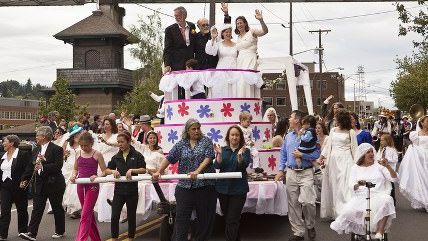What Do You Call it When 14 Fla. Counties Stop Having Courthouse Weddings Entirely? Perhaps a Good Start.


Gay marriage recognition comes to Florida this week, and the state is handling it the way it handles pretty much everything else by making a big mess out of it. The ruling that brought gay marriage recognition to Florida started off like those in other states. A federal judge ruled in 2014 that Florida's ban on gay marriage recognition was unconstitutional. The state resisted, and there had been a lot of debate over the extent of the judge's ruling. The ruling had been stayed, but the stay will be lifted tomorrow and the celebrations will begin (As I wrote this, the Associated Press tweeted that gay marriage recognition may begin today in the Miami area).
On past occasions, county clerks who do not approve of gay marriage have attempted to refuse to comply with the law and refuse to hand out licenses. This tends to not end well for the clerks because they can't just refuse to do their jobs and get away with it. It's not like they're police officers.
But it doesn't—and shouldn't—mean the clerks have to tell gay couples how awesome and wonderful it is that they're getting married. So in response, some 14 Florida counties are going to end the practice of performing wedding ceremonies at the courthouses for all couples. They will still hand out marriage licenses; they just won't perform the weddings. The Tampa Bay Times spoke to Pasco County Clerk Paula O'Neil. She's opting out:
Most of her staff who handle marriage licenses were "uncomfortable" officiating same-sex weddings, she said.
"The problem is we can't discriminate," she said. "So there are some people who would have wanted to transfer to another area, and we can't transfer everybody."
Pasco's new policy began on Oct. 1, months after a federal judge struck down Florida's same-sex marriage ban but before his ruling took effect. Gay couples who wish to be married can get licenses, O'Neil said, but they have to find their own officiants.
The clerks may have made these changes for petty or political (clerks are elected positions) reasons, but it's a good—if symbolic—development for anybody leery about the role government plays in marriage. It should be considered deeply unsettling to be turning to government bureaucrats to bless your relationships, regardless of one's faith (or lack of faith).
I've argued previously that embracing gay marriage recognition will help dismantle this mistaken belief that the government has any sort of stake in determining the nature of relationships among consenting adults. Florida has even managed to add some extra rent-seeking in its process of acknowledging marriages. Their marriage licenses come with a three-day delay before taking effect, unless couples are willing to take a four-hour premarital course from an approved counselor. Those folks can get married the same day. One county clerk told the Tampa Bay Times she would be waiving the course for the first round of ceremonies tomorrow. Maybe she should just waive it forever and recognize the government has no place ordering people to seek training in how to be a married couple.
Obviously this decision does nothing about the actual problem of so many government policies and benefit structures inappropriately tied to marital status. But getting government functionaries out of the business of literally performing wedding ceremonies is a right move for the wrong reasons. I acknowledge that gay people getting married inside of (or in front of) courthouses makes for lovely, photogenic moments in a movement where the government has long served as a barrier or a threat. I'd much rather see us move to the place where we're the ones telling the government about our relationships (should we choose to do so) and away from a place where we're begging the government to allow it.
